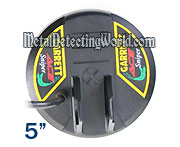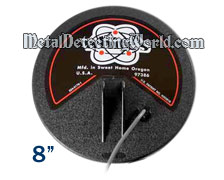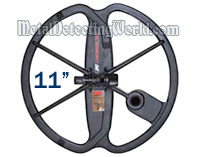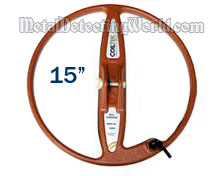Search Coils for Metal Detectors, page 5
Search Coil Size Application:
Successful Metal Detecting Also Depends on Search Coil Size
Successful Metal Detecting Also Depends on Search Coil Size!
As it happens quite often to beginners, they can not find a single good target at the hunt site that has been proven to be "fruitful" and still contains many valuables. In most cases, the reason is simple: they use a search coil of a wrong size. Depending on your "scope of action," you always should determine which coil size is the most optimal for each task before detecting. Sometimes it is necessary to employ two or even three different search coils at the same hunt site. Here is a general information on search coil sizes and their applications:
 • Smallest Search Coils (up to 5" in diameter) - "Mini Coils" or "Snipers," are great for extremely trashed areas, really allowing you to "catch" coins in between numerous iron nails and other junk. "Mini coils" provide better separation of trash and desirable targets in close proximity and have an ability to detect close to metal poles and wire fences without detecting them.
• Smallest Search Coils (up to 5" in diameter) - "Mini Coils" or "Snipers," are great for extremely trashed areas, really allowing you to "catch" coins in between numerous iron nails and other junk. "Mini coils" provide better separation of trash and desirable targets in close proximity and have an ability to detect close to metal poles and wire fences without detecting them.
These coils are also the best for detecting in tighter spots and around natural obstacles such as dense vegetation, tree roots and crevices. Mini coils are very sensitive to the smallest and shallow targets to which their reactivity is increased. These coils are maneuverable and weightless. Their drawbacks are their shallow operational depths and smallest coverage area.

• Small Search Coils (5" - 8" in diameter) are used for "trashy" areas and highly mineralized ground. These coils are maneuverable in heavy vegetation or on rough terrains. They have more operational depth range than "snipers" but less than medium-sized coils.
These coils, both concentric and 2D, have proved to be the most effective in searching around cellar holes and at the sites of old homesteads. If the mineralization intensity is low and the trash content is moderate, the 8" search coil will give you the best depth, target separation and ease of pinpointing.
The 7.25" Double D search coils can easily compete with 9.5" and 10.5" coils under certain conditions and program settings. By virtue of their small coverage area, the small coils impose and promote a more disciplined scan rate and overlap (see more info in "Search Coil Discipline In Details" on next page).

• Medium Search Coils (8" - 11.5" in diameter) usually come standard with your metal detector. These coils are the "golden medium" among all coils and designed for general use in finding the wide range of targets, and under average metal detecting conditions.
If the mineralization intensity is high and trash content is low, the 9.5"-11.5" Double-D search coil should be used for optimum depth and coverage.
Although these coils do a great job, they lose their effectiveness under extreme metal detecting conditions that might occur on either side of the "average" range. For example, if the hunt site is trashed with iron, the 11.5" coil should be replaced by the 7- or even 5-inch search coil to find targets that are partially masked by nails. If metal detecting takes place at a large farm field, the 11.5-inch coil should be replaced by a larger coil (15" or larger) to cover a vast area quicker.

• Large Search Coils (11.5" - 24" in diameter) are designed to penetrate the ground at the most depth. Theoretically, the larger the search coil, the deeper it will detect targets. In reality, it is not always true because the amount of detected mineralization has negative effect on detector's performance: the larger the coil, the more mineralization it "catches." This disables a metal detector in terms of deep ground penetration. The maximum practical size of a large search coil was experimentally determined to be 15" (38 cm). Using a search coil of a bigger size (diameter) would not increase operational depth range unless you use a Pulse Induction metal detector.
Large coils are very useful for finding coin caches and deeply buried, large relics. Large coils provide a considerable ground coverage. Detecting with a large coil enables a detectorist to cover a vast territory, such as a large farm field, more quicker than with a medium search coil. The large search coil's drawbacks are its lack of sensitivity to small targets, poor pinpointing, simultaneous rejection and masking of more targets, and its weight. A Hip-mount or Body-mount configuration is recommended for metal detecting with a large search coil for long hours.
The "rule of thumb" governing larger search coil use is as follows: "as the size and depth of the target you seek increases, and the concentration of junk targets in the search area decreases, the size of your search coil should increase."
NOTE: When making a change in search coil size during a hunt, always check and readjust Ground Balance (if it is manual) and Discrimination settings. Changes in the search coil diameter and its configuration also may give depth readings (if your detector features a depth meter) over or under actual target's depth.
NOTE: Because search coils come in all shapes and sizes nowadays, changing the search coil on your metal detector may be the best alternative to buying a whole new machine in case you need to update. However, it can not be that easy as it seems... Please read item 3 in my next note.
NOTE: Avoid using the "Hot" and "Excelerator" cheap search coils due to the following reasons:
1) These coils are built from cheap materials that do not last longer than a few months.
2) As these search coils are put together by the unskilled and underpaid workforce located either in Asia or Eastern Europe, the quality of coil assembly is poor.
3) Your metal detector is NOT TUNED specifically to search coils it did not come with! Unless you have a similar search coil, which is native to your metal detector, to compare to the additional one you have purchased, you would not know that your detector is not performing effectively with a new coil. Even after buying a brand new search coil made by the detector's manufacturer, one has to send both metal detector and new coil to the manufacturer's regional repair center for proper tuning and adjustments. When purchasing metal detecting equipment (or any equipment!) and accessories, always remember that the cheapest stuff is the hardest to afford!